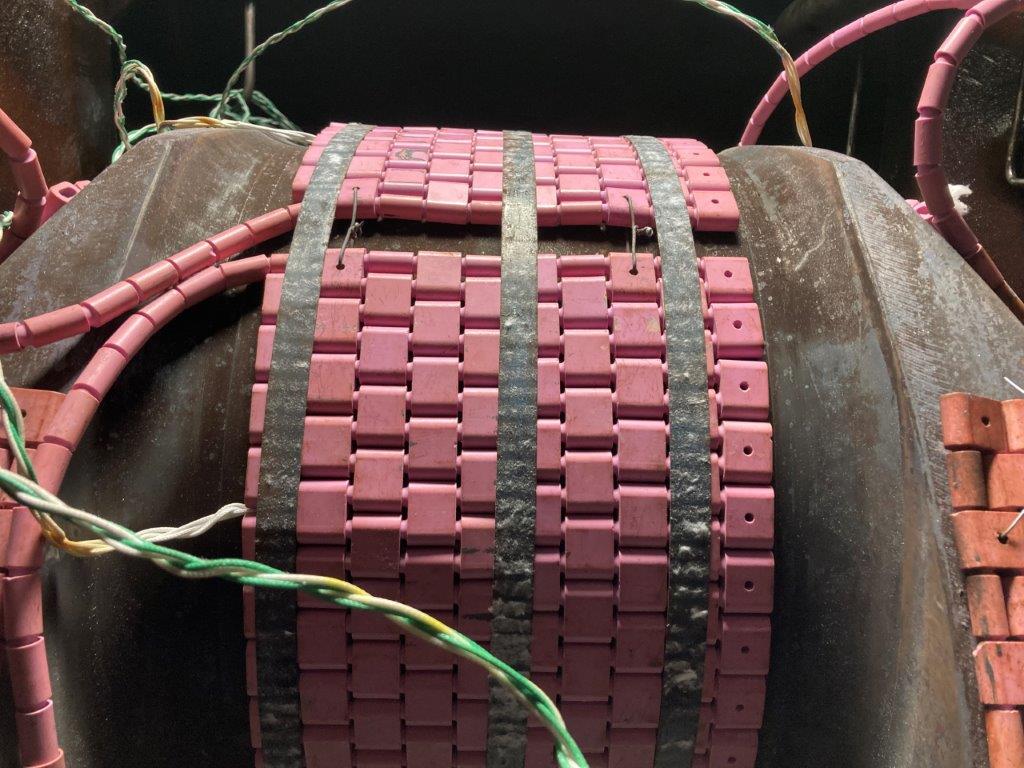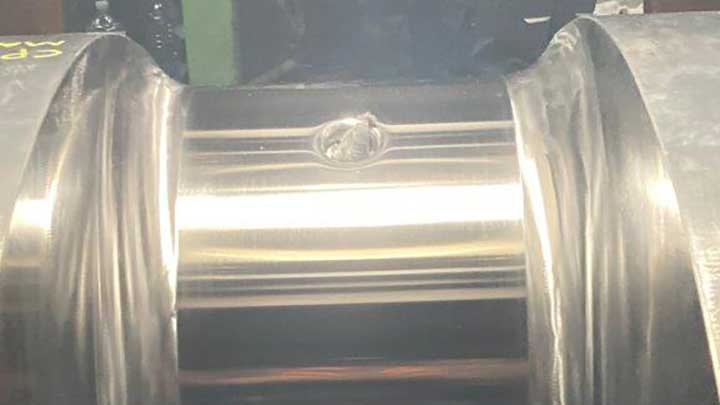Big end bearing failure? No problem: How In-situ heat treatment (annealing) by MAN PrimeServ can be a lifesaver for crews
Being disabled and adrift at sea is just about the worst that can happen to a ship. This was the fate that befell a container vessel in December 2021, when it was two days before it could be towed into port at Taranto (Italy) following a big-end bearing failure.
“The failure occurred just before Christmas when our people were already enjoying a well-earned break, as it were. Then, on top of everything, a member of the crew tested positive for Covid and the whole ship was put into quarantine,” says Albrecht Freundshuber (Head of Technical Service Augsburg), looking back.
But, even in this challenging situation, MAN PrimeServ found a solution. The damage survey carried out over the Christmas holidays revealed that crankpin no. 6 on the 7L58/64CD was badly damaged and extensive mechanical processing would be necessary.
So in January, when the quarantine period ended, an international task force from MAN PrimeServ (Germany, Denmark, BeNeLux and Italy) traveled to Taranto to tackle the repair in situ.
Crankpin problem
Owing to the extent of the damage (lube contamination and damage to crankpin no. 6), the colleagues had to dismantle the 7L58/64CD completely and repair it with a large number of spare parts.
“One of the biggest challenges was the crankpin, the hardness of which was so high that material removal by means of in-situ processing was necessary,” Gerd Ander (Section Manager Technical Service Augsburg) explains. “To begin with, colleagues ground four millimeters off the original diameter, but the material hardness was still much too high. We therefore decided to carry out a repair that remains unique in the history of MAN: heat treatment (annealing) right there in situ.”
We decided to carry out a repair that remains unique in the history of MAN: heat treatment (annealing) right there in situ.
In-situ heat treatment (annealing) as a lifesaver
Heat treatment – up to 630°C – allows the crankpin to be returned to an acceptable hardness range by means of microstructural transformation without reducing the diameter any further once the cracks in the surface have been completely removed.
Minimal material removal is a further advantage. This process allows the connecting rod pin diameter to be maintained at a larger diameter, avoiding any reduction in engine performance and allowing longer crankshaft life. In the past the pins were reduced until the normal hardness was reached, this led to much smaller pin diameters with the possible use of special connecting rods and extra ordering of the undersize bearings with long delivery times. Sometimes the crankshafts were also exchanged because the engine operator did not accepted a small reduction in performance.
MAN PrimeServ Hamburg was granted approval for the first process of its kind by classification society DNVGL. “MAN PrimeServ colleagues carried out this challenging repair in close collaboration with a specialist firm in Hamburg and were able to deliver the crankpin without cracks and in a permissible hardness range,” says Gerd Ander.

Ceramic heating blankets for the heat treatment – annealing the crank.

Crankpin after annealing, hardness < 320 HB
Classification society’s strict requirements
MAN PrimeServ Hamburg was granted DNVGL approval for a complex heat treatment process. In December 2021, colleagues were able to demonstrate their outstanding expertise when faced with an unusual failure.
“The heat treatment process was developed in order to achieve the prescribed hardness of hardened crankpins in the case of an integrated crankshaft. Various tests also have to be passed for a complete crankshaft repair to be approved. After the damage has been repaired, the crankpin must comply with the measurement and geometry requirements in the drawing and there must be no cracks in the crankshaft,” says Jörg Fraass (Superintendent Engineer & Onsite Recovery Hamburg), running through the classification society’s strict requirements. “Ultimately, every repair of this type has to be decided on a case-by-case basis.” Thanks to MAN PrimeServ´s experts, the vessel was able to resume its journey with the 7L58/64CD in a matter of six weeks.
Conclusion
The cooperation of the global MAN PrimeServ organization has once again demonstrated that we are able to overcome problems with viable solutions as a team. But there is also more to know: With a Splash Oil Monitoring System, this damage can be completely prevented.
Please reach out to us to get more information:
Photocredits: Title (c)Hansfair; Copy MAN Energy Solutions
MAN Energy Solutions is now Everllence.
We have adopted a new brand name and moved to a new domain: www.everllence.com. This page will also be relocated there shortly. We are working on shifting all pages to www.everllence.com.
